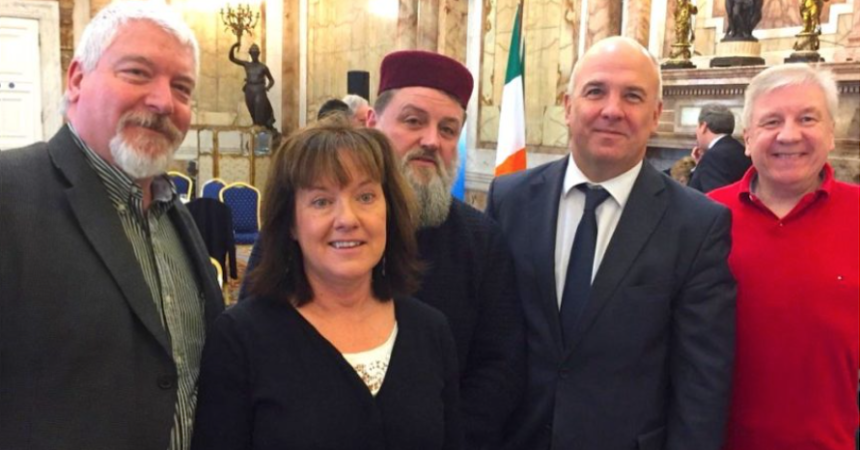
Yet another Council of Europe Report calls for end to religious discrimination in Irish schools
Atheist Ireland welcomes that the Council of Europe Commissioner for Human Rights, Nils Muiznieks, has told the Irish Government that the State is responsible for ending the breaches of human rights of atheist and minority faith pupils and parents in Irish schools.
When Commissioner Muiznieks visited Ireland last November, he met with Atheist Ireland, the Evangelical Alliance of Ireland and the Ahmadiyya Muslim Community of Ireland (pictured above).
We told him that the State needs to end all aspects of religious discrimination in Irish schools, and not merely in admission. There is no point in having equal access to a school that discriminates against you if you get in. We are pleased that his report strongly vindicates this position.
This is the tenth such recommendation in recent years by United Nations and Council of Europe human rights regulatory bodies that has vindicated our position.
Commissioner Muiznieks has called for amending Section 15(2)(b) of the Education Act 1998 (that obliges schools to uphold the religious ethos of the patron), low-threshold options for a child to get exemptions from religious instruction, the delivery of the State curriculum in an objective, critical and pluralistic manner at both primary and secondary level, divesting to or opening non-denominational schools, and removing Section 7(3)(c) of the Equal Status Act 2000 (that allows state-funded schools to discriminate on the ground of religion in admission policies).
Atheist Ireland has consistently raised these issues with the Taoiseach, the Minister for Education, the Oireachtas Education Committee, IHREC, political parties, the United Nations, Council of Europe, OSCE and the general public.
The Government’s formal response to the report merely states that schools are obliged to uphold the ‘characteristic spirit’ of the school, and not the ‘religious ethos’ as stated in the report. But the Government knows that this is misleading, as the religious ethos of the Patron body informs the characteristic spirit. It must also realise at this stage that it can no longer continue to evade its human rights duties to children, parents and teachers in Irish schools.
Specific Policy Recommendations
Commissioner Muiznieks has called on the State to: (number refer to paragraphs in the report.)
- Ensure that the curricula in state-funded schools are taught in an objective, critical and pluralistic manner. In particular, Section 15(2)(b) of the Education Act 1998 obliging schools to uphold the religious ethos of the patron should be amended to ensure that school ethos always favours inclusive education and does not have a discriminatory impact on children from minority religions or without religion. (134)
- Provide as a matter of urgency low-threshold options for a child and his or her parents to get exemptions, with the purpose of preventing children from being exposed to religious instruction against their own will or that of their parents. (133)
- Review the content and way of teaching of the course on religion education (RE) in secondary schools and modify it accordingly so as to ensure that it genuinely covers all religious cultures and is no longer perceived as instruction in one particular religion and in particular the prevalent religion. (133)
- Rapidly take all necessary measures to significantly increase the diversity of schools notably through the divestment to non-denominational schools or the opening of such schools. He also recommends that the exemption provided for by Section 7(3)(c) of the Equal Status Act 2000, allowing state-funded schools to use the religion of the child as one of the admission criteria, be removed. (132)
Underlying Human Rights Principles
Commissioner Muiznieks also raised the following underlying human rights principles:
- Inclusive education is a principle that places the responsibility on states to educate all children without any discrimination within the mainstream system. (130)
- The European Court of Human Rights has stated that the state must take care that the curriculum is conveyed in an objective, critical and pluralistic manner, enabling pupils to develop a critical mind with regard to religion in a calm atmosphere which is free of any misplaced proselytism. It is forbidden to pursue an aim of indoctrination that might be considered as not respecting parents’ religious and philosophical convictions. (130)
- The UN Special Rapporteur on Freedom of Religion and Belief has stated that, where private denominational schools having a de facto monopoly in a particular locality or region, it falls upon the State, as the guarantor of human rights, to ensure that freedom of religion or belief is effectively respected, including the right of students not to be exposed to religious instruction against their will as well the right of parents to ensure a religious and moral education of their children in conformity with their own convictions.” (131)
- The Commissioner also draws attention to the Toledo Guiding Principles on Teaching about Religions and Beliefs in Public Schools. (131)






0 Comments
No comments!
There are no comments yet, but you can be first to comment this article.